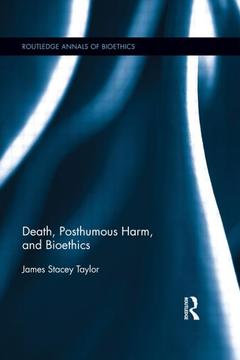Description
Death, Posthumous Harm, and Bioethics
Routledge Annals of Bioethics Series
Author: Taylor James Stacey
Language: English
Subjects for Death, Posthumous Harm, and Bioethics:
Keywords
consent; donor; dying; Epicureanism; Euthanasia; metaphysics; organ; suicide; thanatology; Posthumous Harm; Young Man; Posthumous Reproduction; Presumed Consent; Antemortem Person; Ante-mortem Person; Hedonic Variant; Epicurean Argument; Epicurean View; Postmortem Pregnancy; Presumed Consent Policies; Postmortem Bodies; Postmortem Person; Epicurean Position; Mistaken Removals; Tony’s Death; Backwards Causation; Non-interference Model; Cadaveric Organs; Nagel’s Argument; Hedonistic Account; Reconciliation Strategy; Desire Theory; Existence Variant; Posthumous Events
Publication date: 05-2015
· 15.2x22.9 cm · Paperback
Publication date: 08-2012
272 p. · 15.2x22.9 cm · Paperback
Description
/li>Contents
/li>Readership
/li>Biography
/li>
Death, Posthumous Harm, and Bioethics offers a highly distinctive and original approach to the metaphysics of death and applies this approach to contemporary debates in bioethics that address end-of-life and post-mortem issues. Taylor defends the controversial Epicurean view that death is not a harm to the person who dies and the neo-Epicurean thesis that persons cannot be affected by events that occur after their deaths, and hence that posthumous harms (and benefits) are impossible. He then extends this argument by asserting that the dead cannot be wronged, finally presenting a defence of revisionary views concerning posthumous organ procurement.
Introduction: Death Unterrible 1. Posthumous Harm and Interest-based Accounts of Well-being 2. Further Criticisms of the Possibility of Posthumous Harm 3. The Impossibility of Posthumous Harm 4. Can the Dead be Wronged? 5. Why Death is Not a Harm to the One Who Dies 6. Fearless Symmetry 7. Epicureanism, Suicide, and Euthanasia 8 . Epicureanism and Organ Procurement 9. Further Bioethical Applications of Full-blooded Epicureanism Conclusion
James Stacey Taylor is Associate Professor in the Department of Philosophy, Religion, and Classics at The College of New Jersey.




